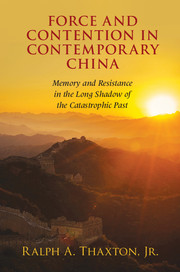 Force and Contention in Contemporary China
Force and Contention in Contemporary China Book contents
- Frontmatter
- Dedication
- Contents
- List of Illustrations
- Acknowledgments
- Cast of Characters for Da Fo Village and Several Other Villages in the Hebei-Shandong-Henan Border Area, 1945–2013
- Maps
- Introduction
- 1 The Violent Dawn of Reform
- 2 Contemporary Tax Resistance and the Memory of the Great Leap
- 3 Birth Planning and Popular Resistance
- 4 Rural Schools and the “Best Citizens of the State”: The Struggle for Knowledge and Empowerment in the Aftermath of the Great Leap
- 5 Official Corruption and Popular Contention in the Reform Era
- 6 The Rise of the Electricity Tigers: Monopoly, Corruption, and Memory
- 7 The Defeat of the Democratic Experiment and Its Consequences
- 8 Contentious Petitioners and the Revival of Mao-Era Repression
- 9 Migration and Contention in the Construction Sector
- 10 The Rise of the Martial Artists and the Two Faces of Mafia
- Conclusion: Big Questions and Small Answers from Da Fo
- Bibliography
- Index
- Miscellaneous Endmatter
Introduction
Published online by Cambridge University Press: 05 August 2016
- Frontmatter
- Dedication
- Contents
- List of Illustrations
- Acknowledgments
- Cast of Characters for Da Fo Village and Several Other Villages in the Hebei-Shandong-Henan Border Area, 1945–2013
- Maps
- Introduction
- 1 The Violent Dawn of Reform
- 2 Contemporary Tax Resistance and the Memory of the Great Leap
- 3 Birth Planning and Popular Resistance
- 4 Rural Schools and the “Best Citizens of the State”: The Struggle for Knowledge and Empowerment in the Aftermath of the Great Leap
- 5 Official Corruption and Popular Contention in the Reform Era
- 6 The Rise of the Electricity Tigers: Monopoly, Corruption, and Memory
- 7 The Defeat of the Democratic Experiment and Its Consequences
- 8 Contentious Petitioners and the Revival of Mao-Era Repression
- 9 Migration and Contention in the Construction Sector
- 10 The Rise of the Martial Artists and the Two Faces of Mafia
- Conclusion: Big Questions and Small Answers from Da Fo
- Bibliography
- Index
- Miscellaneous Endmatter
Summary
This book is about the troubled relationship between the Chinese Communist Party (CCP) and village dwellers in a rural border area of China. These villagers hold durable memories of the most traumatic episode of the Maoist past, known as the Great Leap Forward, a state-driven campaign to regiment and collectivize every aspect of human life in the years 1958–1961. Imposed by Communist Party activists loyal to Mao at the county, township, and village level, this campaign produced the most catastrophic famine in modern world history, killing at least 40–45 million rural dwellers in one way or another. The scale of death from this campaign is mind boggling. Almost twice as many people died in the Great Leap famine as in the Taiping Rebellion – the world's most devastating civil war. Actually, Mao and his political base wiped out three times more people during this episode of war communism than were exterminated by Stalin's and Hitler's cadres, armies, and death squads in Eastern Europe between 1933 and 1945.
In the throes of the great famine, many of China's rural people came to believe that the Mao-led Communist Party had deliberately starved them to death. Their instincts were right. As early as March 1959, Mao Zedong knew about the famine unfolding in the countryside, yet he and his party still relentlessly pushed for higher levels of grain procurement, thereby delivering millions on millions of villagers into the arms of death.
People in Tianxia village, Qin'an county, Gansu province, suffered this fate. Here commune party leaders and their brigade-level accomplices seized all of the harvest for the state, leaving villagers to starve on a grain ration of only two liang per day – a far cry from the officially promised ration of one pound per day. Qin Ruisheng, one of Tianxia's survivors, lost her father and four siblings to the sharp hunger of late 1958. At age fourteen, Qin managed to survive by scavenging wild grass and plant stems from the stark landscapes of various brigades (villages). In the course of her desperate travels, Qin found that brigade-level cadres routinely tossed dozens of starved bodies into nearby ditches.
- Type
- Chapter
- Information
- Force and Contention in Contemporary ChinaMemory and Resistance in the Long Shadow of the Catastrophic Past, pp. 1 - 33Publisher: Cambridge University PressPrint publication year: 2016


